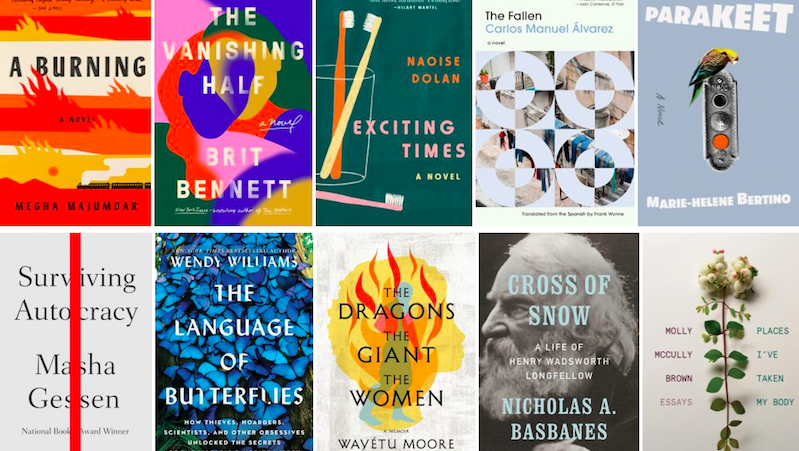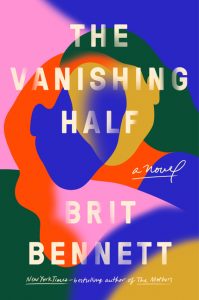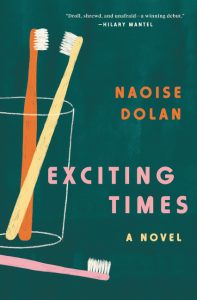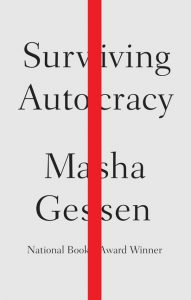
Megha Majumdar’s A Burning, Brit Bennett’s The Vanishing Half, Masha Gessen’s Surviving Autocracy, and Wayetu Moore’s The Dragons, The Giant, The Women all feature among the Best Reviewed Books of the Week.
1. A Burning by Megha Majumdar
9 Rave • 4 Positive • 1 Mixed
“This is a book to relish for its details, for the caress of the writer’s gaze against the world, the way it dawdles over all that might be considered coarse or inconsequential … Majumdar’s descriptions of life, of stench and bodies, of stifled ambitions and stoked resentments, feel instructive, a rejoinder to the ways reality is so commonly distorted … Majumdar writes with a lanky, easy authority; the narrative stride is broken only by rare missteps … What we describe helplessly as our fate is, very often, other people’s choices acting upon us—choices that remain largely unknown or, at best, dimly perceived. The novel flays open these mysteries … The interplay of choice and circumstance has always been the playing field of great fiction, and on this terrain, a powerful new writer stakes her claim.”
–Parul Sehgal (The New York Times)
Read an excerpt from A Burning here

2. The Vanishing Half by Brit Bennett
10 Rave • 2 Positive • 1 Mixed
“Bennett pours a small kitchen sink of contemporary issues … Bennett pulls it off brilliantly … Bennett locks readers in and never lets them go … Bennett’s method of sliced-up storytelling takes the spotlight away from Stella long enough that by the time this living metaphor returns to the story, it feels honest and earned … Although Bennett’s essays and fiction undeniably have a social-justice agenda, she leaves any weighty parallels—between, for example, racial and gender determinism—to the reader. Her restraint is the novel’s great strength, and it’s tougher than it looks … stunning … One of Bennett’s many small masterstrokes is to put one of the deepest ironies of the book in the mouth of a villain … The Vanishing Half speaks ultimately of a universal vanishing.”
–Bethanne Patrick (The Los Angeles Times)

3. Exciting Times by Naoise Dolan
4 Rave • 7 Positive • 1 Mixed
“The arch title of Naoise Dolan’s whipsmart debut novel, Exciting Times, is the first indicator of the author’s style … The voice is astute, sardonic and highly emotionally aware. The exciting times mainly take place inside her head, where a vast, neurotic mind constantly analyses her own behaviour and second-guesses the actions of others … Exciting Times is an impressive, cerebral debut written with brio and humour … There are strong parallels with the intelligent female narrators in the writing of Nicole Flattery and Sally Rooney … The self-aware commentary…over-reaches at times … but it is a minor criticism of a debut that is as intricate as it is brash, with a style that is charmingly belligerent from start to finish … The observations are keen, heartfelt and delivered in a brutally nonchalant style … For a novel that spends most of its time inside the protagonist’s head, it is a surprisingly exciting read, heralding for sure a new star in Irish writing.”
–Sarah Gilmartin (The Irish Times)
Read an excerpt from Exciting Times here
4. The Fallen by Carlos Manuel Alvarez
4 Rave • 4 Positive • 1 Mixed
“Although Álvarez’s characters deal with their poverty without wallowing in sorrow, he doesn’t attempt to romanticize them by suggesting that their hardships dignify them … Álvarez’s prose is terse, which is uncharacteristic of Cuban fiction, and often bleak. He casts a rather cold eye on the parents’ decline and the children’s moral failing…And in a blistering dissection of the revolution’s practice of awarding coveted commodities on the basis of exemplary conduct, the daughter recounts how the prospect of owning a television causes neighbors to attack one another and invent histories of hardship in order to seem more deserving … [offers] extraordinarily pointed and poignant commentary on one of the twentieth century’s most calamitous social experiments, and on the inheritors of its ruins.”
–Coco Fusco (The New York Review of Books)
5. Parakeet by Marie-Helene Bertino
4 Rave • 1 Positive
“It’s…a story prone to soap-operatic revelations and Big Events; but the events are presented in a way that’s more matter-of-fact than melodramatic, and the effect is absurd, and at times deeply funny. The result is a story that is disquieting and darkly comic and vulnerable and true. I laughed throughout; I winced more. Bertino makes her literary allusions overtly, almost winkingly … Surrealist chapters…could exist as stand-alone short stories of the sort that Bertino has previously written. Whatever the references, though, Bertino’s prose is wholly her own. And though her protagonist’s world is governed by dream logic, it’s a credit to the author’s craftsmanship that her characters’ struggles feel grounded in reality. Bertino’s writing is lyrical and sharp and she deploys magical realism alongside a fart joke with equal self-assurance.”
–Bess Kalb (The New York Times Book Review)
**

1. Surviving Autocracy by Masha Gessen
6 Rave • 1 Positive • 1 Mixed
“It echoes analyses and arguments from other Trump books that probe more deeply into particular arenas, yet it is not redundant; this book does not repeat as much as it distills. The result is almost the Platonic ideal of the anti-Trump Trump book, as though manufactured in a lab to affirm every suspicion, stoke every fear and answer every question by those readers desperately seeking a ‘recovery from Trumpism,’ as Gessen writes. The book’s implied ‘we,’ though sometimes encompassing the nation in full, is usually limited to the horrified. And those who are horrified by Trump will find that Surviving Autocracy is a time capsule packed with all their anxieties, and all their certainties, too. It offers discomfort and reassurance at once … One of Gessen’s strengths is her ability to capture what daily life feels and sounds like in the Trump era, and how abnormality remains so even when it is pervasive … If this book offers no other imperative, it is to remember that the choice always remains.”
–Carlos Lozada (The Washington Post)
Read an excerpt from Surviving Autocracy here
2. The Language of Butterflies: How Thieves, Hoarders, Scientists, and Other Obsessives Unlocked the Secrets of the World’s Favorite Insect by Wendy Williams
4 Rave • 2 Positive
“…informative, thought-provoking … Williams is a consummate storyteller, and her narrative seamlessly integrates scientific facts with vivid portraits of characters as colorful as the butterflies that intrigue and inspire them … While the news for butterfly populations is sobering, Williams urges us to never give up the work of conservation … The Language of Butterflies is more than a small contribution to this crucial effort.”
–Deborah Hopkinson (BookPage)
3. The Dragons, The Giant, The Women by Wayetu Moore
4 Rave • 1 Positive
“…[an] immersive, exhilarating memoir …This memoir adds an essential voice to the genre of migrant literature, challenging false popular narratives that migration is optional, permanent and always results in a better life … The Dragons, the Giant, the Women also resists the pervasive, narrow-minded, gratuitously violent stereotypes of Africa that haunt Tutu during her school years in the West … Those starving right now for physical contact with loved ones outside their immediate homes will find special resonance in Tutu’s parents’ eventual reunion in Sierra Leone … Likewise, separations in this book are written with equal intimacy, and heartbreak … The book, jumping confidently across decades and continents and even narrative perspectives, closes with a section of such masterful danger and suspense that the reader is afraid for Moore’s life.”
–Grace Talusan (The New York Times)

4. Cross of Snow: A Life of Henry Wadsworth Longfellow by Nicholas Basbanes
2 Rave • 3 Positive • 1 Mixed
“Absorbing the underlying message of Longfellow’s poetry, Mr. Basbanes writes about him the way a friend would, with generosity, gentleness and grace … Mr. Basbanes never pummels his sources into revealing more than they will yield … Buoyed by Mr. Basbane’s palpable enthusiasm over his discoveries, the reader feels warmly invited to enter the author’s charmed circle of friendship … [focuses] much of his book on Longfellow’s far less buttoned-up second wife, the brilliant Fanny Appleton, daughter of one of the richest men in New England … Mr. Basbanes’s singular achievement in Cross of Snow is to bring this remarkable woman back to life. He writes about her the way Longfellow would have, with respect, admiration and, yes, a lover’s eye. But he is also happy to let Fanny speak for herself … Mr. Basbanes’s book, marvelously rich in biographical detail, has only limited space for the poetry. But much remains to be discovered there.”
–Christopher Irmscher (The Wall Street Journal)
5. Places I’ve Taken My Body by Molly McCully Brown
2 Rave • 3 Positive
“… searing and ineffable essays … Brown describes in gorgeous prose her lifelong struggle with cerebral palsy, which has confined her to a wheelchair. At times painful to read, it is equally difficult to put down. The reader feels Brown’s anguish but also appreciates fleeting moments of beauty … The essays are enlightening on so many levels as she describes situations many of us take for granted … Brown’s essays can feel like a punch in the gut, but they are beautiful, nevertheless.”
–June Sawyers (Booklist)

